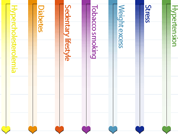Objective
Immerse the patient in an educational environment that is adapted to his/her needs, from his/her admission to the hospital to his/her visits to the GP. Therapeutic patient education (TPE), an approach successfully used for other chronic diseases (diabetes, HIV), is the basis of this program.
Methods
Patient-care provider team
The care provider will help the patient use his/her resources and find meaning, so that he/she is the main actor in his/her treatment. As a healthcare consumer, he/she becomes accountable for his/her own health.
Motivational support aimed at changing behavior is an integral part of this process. All cardiology service teams are trained on TPE.
Communication support
The originality of the ELIPS®program is that it also defines several types of communication support:
- An interactive mural that allows patients to explore modifiable cardiovascular risks, such as high cholesterol, diabetes, a sedentary lifestyle, smoking, being overweight, high blood pressure and stress.
- Healthcare Practical Advice Sheets
- The website, which is also multilingual, makes it possible for patients to have control over their health together with their doctor and the friends and family of their choice. It is also targeted at care providers.
- An educational film “Fighting myocardial infarction and atherosclerosis” which is available in six languages, contributes to increase understanding of the disease and all its implications
- A glossary of cardiovascular diseases.
Evaluated Effectiveness
Designed as a true global education concept, ELIPS® is offered free of charge to all interested hospitals.
General practitioners and cardiologists are also involved in the program, since they are featured in it and since they receive the film free of charge, to distribute to their patients and discuss with them.
Moreover, an international multicenter clinical study will evaluate the effectiveness of the program on the relapse of cardiovascular events at year one. With 2,800 subjects to be enrolled, the results are expected in three to four years (2011/2012).
